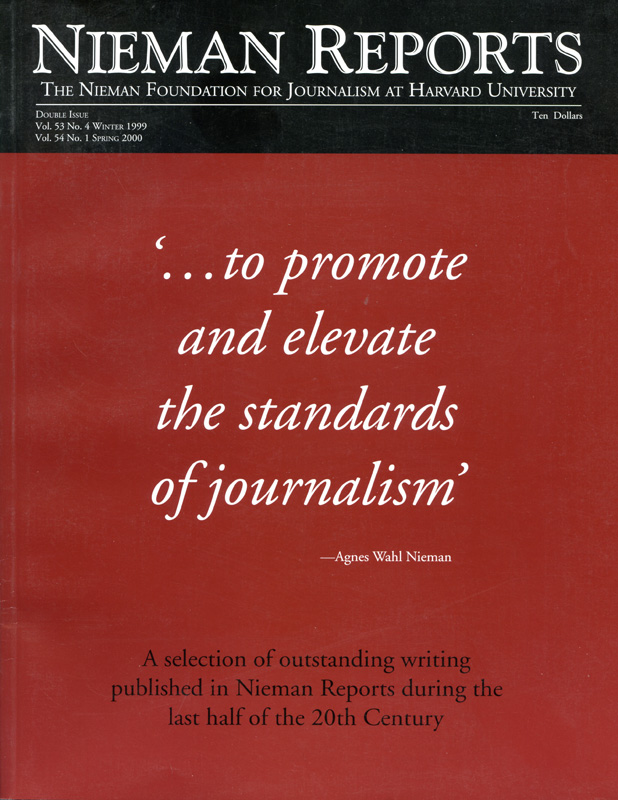[This article originally appeared in the December 1970 issue of Nieman Reports.]
…Those who would improve our practices in questionable ways come not only from the outside in the form of powerful politicians. Some come from the inside. Militant young men and women, in both newspapers and broadcasting who argue that even the quest for objectivity is a myth, that the prime purpose of the press is not to report the world but to reform it, and in the direction of their ideas. We have all read the learned articles that tell us objective news accounts in the hard news columns or broadcasts tend merely to deceive the reader or hearer, obscure inner truths that the reporter perceives. He must therefore personalize the news, infuse it with his own truth. They would not leave this to the editorial writer, columnist and commentator, whose work is clearly marked away from the hard news. They believe this will give a true integrity to news columns and news broadcasts. I believe it will ruin them. There is nothing new about this idea. In fact, this is the way it was done in the days of the yellow press and the screamers of radio’s first faltering years. This is the way it is still done in many countries. The result there is that one must read many papers, hear many broadcasts, then try to piece together what really happened in any given occurrence. Inevitably, this becomes the journalism of polemics.
What Yale’s Kingman Brewster said is true for a university is true for the press. “Cynical disparagement of objectivity as a myth,” he said, “seems to me both naive and irresponsible. Any claim of novelty to the observation that men are fallible at best, corruptible at worst, is naive. Its irresponsibility lies in the conclusion that, since the ideal is unattainable, it should not be held up as a standard to both practitioners and critics.”…
The above text is from the Fourth Annual Elmer Davis Memorial Lecture at Columbia University, given by CBS correspondent Eric Sevareid.
…Those who would improve our practices in questionable ways come not only from the outside in the form of powerful politicians. Some come from the inside. Militant young men and women, in both newspapers and broadcasting who argue that even the quest for objectivity is a myth, that the prime purpose of the press is not to report the world but to reform it, and in the direction of their ideas. We have all read the learned articles that tell us objective news accounts in the hard news columns or broadcasts tend merely to deceive the reader or hearer, obscure inner truths that the reporter perceives. He must therefore personalize the news, infuse it with his own truth. They would not leave this to the editorial writer, columnist and commentator, whose work is clearly marked away from the hard news. They believe this will give a true integrity to news columns and news broadcasts. I believe it will ruin them. There is nothing new about this idea. In fact, this is the way it was done in the days of the yellow press and the screamers of radio’s first faltering years. This is the way it is still done in many countries. The result there is that one must read many papers, hear many broadcasts, then try to piece together what really happened in any given occurrence. Inevitably, this becomes the journalism of polemics.
What Yale’s Kingman Brewster said is true for a university is true for the press. “Cynical disparagement of objectivity as a myth,” he said, “seems to me both naive and irresponsible. Any claim of novelty to the observation that men are fallible at best, corruptible at worst, is naive. Its irresponsibility lies in the conclusion that, since the ideal is unattainable, it should not be held up as a standard to both practitioners and critics.”…
The above text is from the Fourth Annual Elmer Davis Memorial Lecture at Columbia University, given by CBS correspondent Eric Sevareid.



